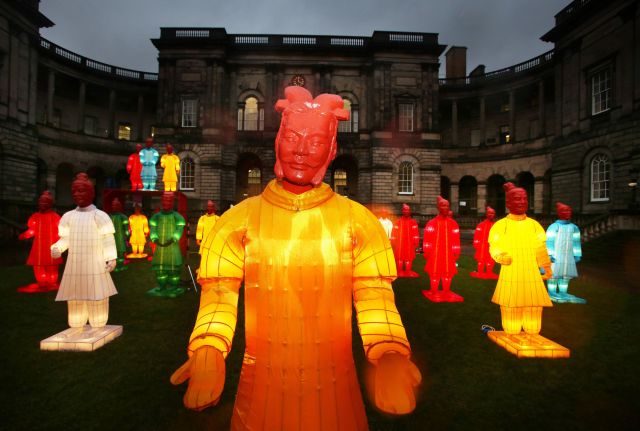Larger than life lanterns inspired by the Terracotta Warriors, created by artist Xia Nan, are lit up at Edinburgh university. (Credit: David Cheskin / PA Images)

Compared with the attention that it gives to America, the western media’s coverage of China is pitiful.
While we’re all-too-familiar with the ever-changing cast list of the Donald Trump show, how many of us could name, say, five Chinese politicians other than Xi Jinping?
The usual, awful, excuse for ignoring other countries – that they’re too poor to count – no longer applies to China. The Chinese economy is already the second biggest in the world and, at some point around 2030, it will overtake America’s.
That leaves the other awful excuse, which is that western audiences are only interested in countries they’re familiar with. This may be true, but if news providers neglect their mission to inform, nothing will change.
Our ignorance of Chinese current affairs is compounded by ignorance of contemporary Chinese culture. How many westerners could name a single living Chinese artist or writer? How many could name five or ten?
But if we’re ignorant about them, we shouldn’t assume that they’re ignorant about us. In a revelatory piece for the Los Angeles Review of Books, Hollis Robins writes about China’s study of western culture:
“A prediction: China will produce some of the world’s most interesting scholarship on American literature within a generation.”
We shouldn’t be surprised if a non-western perspective on western culture yields new insights. But what Robins appears to suggest is that the reason why Chinese scholars may be able to revitalise the humanities is that, in some respects, they enjoy greater intellectual freedom than their western colleagues:
“Free from the invisible social constraints of academic norms — the trends and fashions of academic study — young Chinese scholars are writing with wild abandon…
“The Chinese are fascinated in our scholarship, not just our texts, and are delighted with tales of ‘political correctness’ on America college campuses leaving so many topics unexamined.”
Robins is not denying the reality of life in a one-party state:
“The stories of government censorship and self-silencing are alarming. Within a few days of arriving [in China] I heard the phrase ‘dancing with chains’ to describe the situation of Chinese scholars working in the social sciences on projects that may be uncomfortable or inconvenient to the Chinese government.”
However, academic freedom in America is also under threat – a phenomenon that has not escaped the attention of Chinese scholars who recognise a constraint on free speech when they see it:
“I was peppered by Chinese graduate students after my talk for examples of fear limiting academic discussion in America. I mentioned the student protesters protesting a humanities course at Reed College in Oregon last year.
“I also mentioned an earlier University of Minnesota controversy after the Charlie Hebdo murders. A poster announcing an academic discussion had featured a fairly benign cartoon drawing with CENSORED stamped on it. Some students complained. A months-long formal university investigation followed that found no wrongdoing but cautioned faculty to be careful about what subjects should be publicized. Ah, ‘dancing with chains,’ one student said, and everyone laughed.”
The Chinese government will continue to keep a tight grip on the country’s universities. However, these constraints won’t include the shackles placed upon the humanities by the postmodern left in the West. Unencumbered by safe spaces, trigger warnings, microaggressions, identity politics, critical theory and all the other instruments of ‘wokeness’, the expanding Chinese academy could be in a better position to study western culture than we are.
This will present our own cultural establishment with an exquisite dilemma – either to exclude a non-western body of work on western culture or to engage with ideas that western academics aren’t allowed to express themselves.










Join the discussion
Join like minded readers that support our journalism by becoming a paid subscriber
To join the discussion in the comments, become a paid subscriber.
Join like minded readers that support our journalism, read unlimited articles and enjoy other subscriber-only benefits.
Subscribe